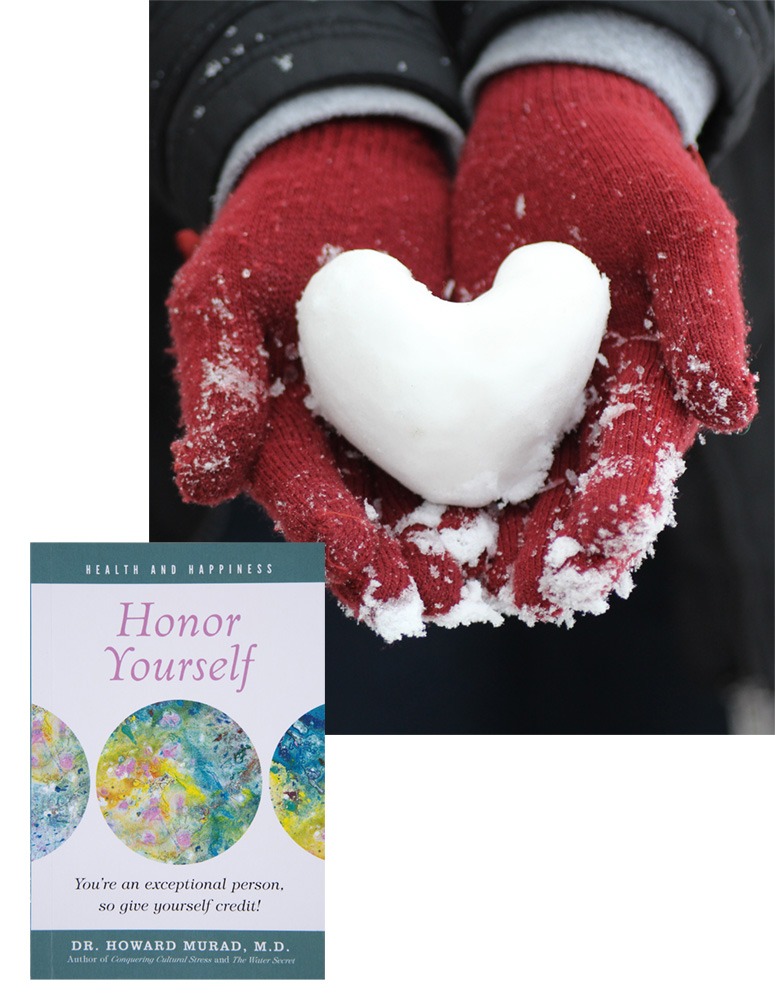Tips to Prevent a Broken Heart
February is American Heart Month, a month dedicated to bringing awareness to heart disease, the leading cause of death for both men and women in the United States. February is also the month we celebrate love and friendship—connections that are vital, not just to our emotional well-being, but our physical heart health, too. That’s why my tips for preventing “a broken heart” include both physical and social aspects.
Here’s my advice for preventing a broken physical heart:
- Remember that before there was medicine, there was food. A healthy diet has been proven to halt and even reduce plaque build-up in the arteries, and healthy eating can fend off heart disease promoters such as type 2 diabetes and hypertension. As an added bonus, you’ll look healthier and younger, too!
- Eat a variety of foods—mostly plants. I also recommend “embryonic foods” like eggs, nuts, and seed.
- Eat your water. Rather than drinking 64 ounces of water/day—most of which runs right through you—eat fruits and vegetables that are high in water content, such as cucumbers, celery, apples, and pears. You’ll get—and retain—the water your cells need. You’ll also get phytonutrients that help boost your immunity.
- Minimize your consumption of animal fats and trans fats, which contribute to plaque build-up in arteries. Instead, switch to healthier fats like olive oil, safflower oil, and other plant-based fats.
- Pack your own healthy lunch rather than eating out (Bonus: this will also save you money!)
- Choose healthier snacks to eat in a hurry—a handful of nuts, instead of chips, for example; or peanut butter and celery rather than crackers and cheese
- Make exercise a daily habit—by making it something, or a variety of things, you enjoy! I personally love walking, racquetball, and ballroom dancing. When exercise is fun, it’s easier to do it more often.
- Practice the 80/20 rule. None of us can achieve perfection 100% of the time. Don’t hold yourself to unrealistic ideals of diet, exercise, or behavior. Life is to be enjoyed! If you follow your diet and exercise plan 80% of the time, give yourself credit—and then give yourself permission to eat and do what you want the other 20%. You’ll be imperfect—but you’ll live longer!
February is also the month we celebrate love and friendship—which are important not just to our emotional well-being, but our physical heart health, too! Studies of the healthiest populations—who live the longest—show that positive social interactions—feeling part of a caring community—are as important as a healthy diet and regular exercise.
How many of us are renters who move every year or two? How many of us are contracted or freelance workers? We once defined ourselves by the company we worked for and the community relationships we built. Today, many people take a cab instead of owning a car, or rent instead of owning a home. This isn’t necessarily a bad thing, but I have discovered living in such an untethered way may leave people craving a sense of belonging – an essential human need.
When we no longer have these indicators of personal stability, we experience a loss of identity, and this feeling of anonymity can lead to greater anxiety, anger, and hostility, all of which have a direct impact on our physical and mental wellbeing. This is part of Cultural Stress.
Here are some tips for protecting your emotional heart:
- Make time in your week for face-to-face socializing. Meet friends for dinner; have them over for game night; get together for a walk in the park or a game of basketball. Whatever you do, put your phone away!
- Cultivate relationships in your neighborhood and profession. Shop locally and get to know the person behind the register. Join neighborhood or professional associations and take advantage of their networking opportunities. Volunteer for a cause you believe in and get to know other like-minded people. Join a sports team; take a cooking class; check out the adult ed offerings at your local community college. Life is full of possible outlets—but it’s up to you to plug yourself in!
- Get to know and appreciate YOU
- Get back in touch with your inner toddler who isn’t afraid to take risks, experience new things, and even fail. It’s all part of our growth and development! Toddlers are pros at expressing their feelings, and they don’t care what anyone else thinks. These are all exemplary traits we can incorporate into our own thoughts and actions.
- Find a stress-reduction strategy that makes YOU happy. It can be yoga, dancing, or taking walks. Being alone in nature is a great stress-reduction strategy. A physical activity you can do with friends is another.
- Don’t compare yourselves to others. You’ll always be a second-rate version of someone else, but you are the CHAMPION you! If looking at Instagram-perfect lives on social media leaves you feeling like a failure, take a break from your phone, or unfollow those people who choose a manufactured image of perfection over real life.
You can find more tips on preventing a broken heart by protecting yourself from Cultural Stress in my Health & Happiness Series.
